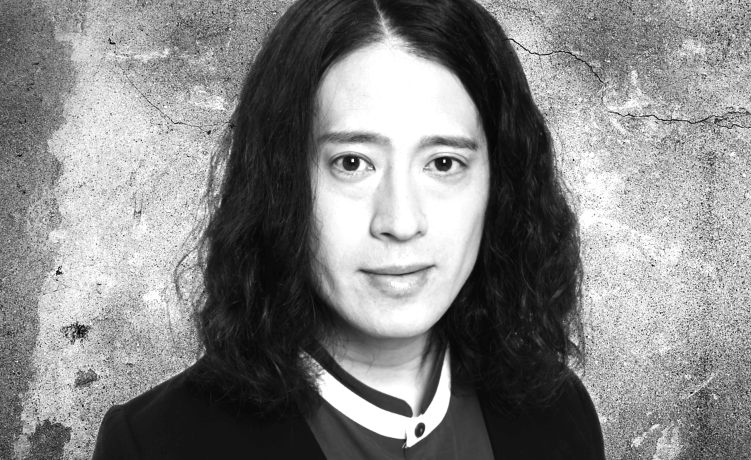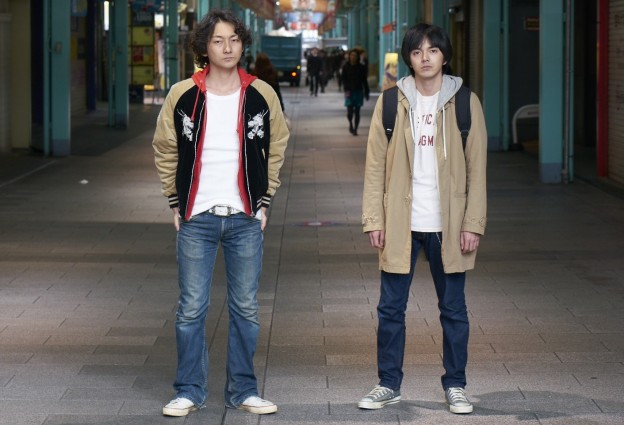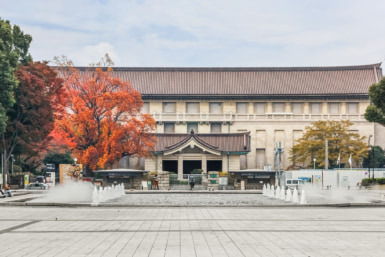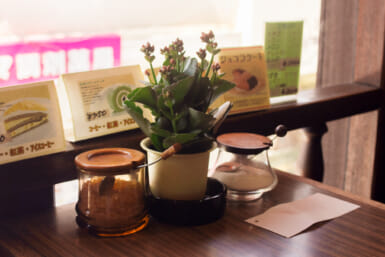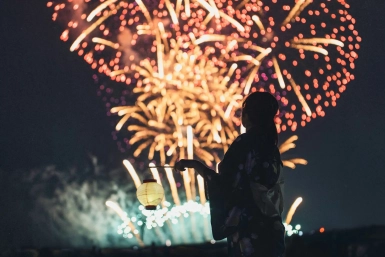How did Naoki Matayoshi go from writing comedy sketches to a bestselling novel that’s been turned into a TV series by Netflix? We sat down with him to chat about his inspirations, and the success of “Hibana.”
An articulate, deep-thinking individual who is known to read up to 10 books a week, Naoki Matayoshi doesn’t come across as your typical stand-up comic. The boke (air-headed) member of the manzai (a style of stand-up comedy) duo Peace, he’s been a notable and admired figure in the Japanese entertainment industry for years, and in 2015 became the first active comedian to win the illustrious Akutagawa Prize for rising authors following the release of his debut feature-length novel, “Hibana” (“Spark”).
The story centers around a young entertainer named Tokunaga who’s struggling to get his big break in the manzai industry alongside comic partner Yamashita. He then has an encounter with the enigmatic comedian Kamiya who takes Tokunaga under his wing, teaching the apprentice his own philosophy of comedy. The pair embark on a journey together, before eventually following different paths.
The compelling tale has proved a huge commercial hit. Last year it was Japan’s best-selling book and has just been launched in Taiwan. Since the beginning of June, a TV series based on the novel has been broadcast by Netflix in 190 countries and is currently available in 19 different languages. While official viewing figures are not yet available, early indications suggest they’ve been strong. With the “Hibana” success story showing no sign of abating, we decided to sit down with Matayoshi to hear more about it.
Which authors were you interested in growing up, and what inspiration did you draw from them?
I was properly introduced to modern Japanese literature at junior high school and became engrossed by the works of writers like Ryunosuke Akutagawa, Natsume Soseki and Dazai Osamu. I’m not going to sit here and pretend I’m capable of writing like them or would ever attempt to, but having read so much of their material, I can’t deny there’s been some influence.
“I’ve always been taken by characters who have deep internal struggles and worries”
What kind of influence?
I’ve always been taken in by the characters in their novels who had their own deep internal struggles and worries. I felt I had some kind of affinity with them; like they were speaking to me. I think perhaps the reason why many people wanted me to write a book was because I have that type of personality.
When you were approached to write a novel, what was your reaction?
Why me? I’ve received a number of requests over the years, but I kept coming back to that same question. There are so many talented writers out there; what could I realistically offer that was different? I wrestled with the idea for a while and then found something I felt only I could write. I got an offer [from Bungeishunju] and decided to go for it. Once I’d made up my mind, it was quite liberating, yet at the same time scary.
After you decided on the theme, how difficult was it to turn that into a full-length novel?
I write comedy sketches on a daily basis, and have composed numerous essays and short stories, but this was on another level. Using specific words to express the intricacies of human thought and introspection proved challenging. It took much more time than anything else I’d previously attempted.
How long?
Around three months.
It’s been described as semi-autobiographical. How similar are you and Tokunaga?
There are elements of myself in both Tokunaga and his senpai (mentor), Kamiya, who shares a lot of the same views of comedy as me. With the former, I deliberately decided to make his age and level of experience in the manzai world the same as mine, but it wasn’t just a case of writing about my own life through Tokunaga. His character is actually based on a combination of people I’ve met through the years and their experiences during that period [2000-2010]. Also, more than the manzai theme itself, what really interested me was the interaction between the principle characters, particularly the whole senpai/kohai paradigm and the way their relationship developed and then fell apart over time. The manzai universe was a unique and easily understandable place to explore these issues.
What did your own comic partner, Yuji Ayabe, make of the book?
I think this was the first novel he’d ever read, certainly of that length anyway. With about 20 pages to go, he asked me when he’d be appearing in it. I don’t think he’s quite grasped the difference between fiction and non-fiction yet [laughs].
What are your own thoughts on the success of “Hibana”?
Of course I’ve been delighted with the reaction. It’s a story about young comedians who aren’t exactly flourishing, but they don’t give up in pursuit of their dream. I think there are many authors who are in a similar position of having the talent, but not getting the recognition. My real hope is that people who’ve read this book will use it as a window to explore more up-and-coming writers. Another thing I’m excited about is the fact that “Hibana” will be read by people overseas. It’s now in Taiwan and hopefully more countries to follow. It’d be great to help raise awareness of the Japanese comedy scene abroad and if some performers here could make it big internationally as a result of that, even better.
The Akutagawa Prize certainly helped with sales. What were you doing when you found out you’d won?
I was waiting in a hotel lobby with my manager and editor. I didn’t think I had a chance of winning but, as I’m on TV a lot, I knew that regardless of the result the press would want to interview me. I was conscious about not appearing sulky or downhearted and started racking my brain trying to come up with something funny to say to mask the disappointment. Then I heard the good news. It was unbelievable.
What about when you were first told about the TV drama; were you concerned it wouldn’t do the book justice?
Not really. Like everyone, I’ve read books and then been disappointed by the movie or TV adaption, but I think it’s important to remember they’re two different things. I’d be too afraid to make someone else’s story myself, but I felt at ease after speaking to the directors. They had a great understanding and sense of what the novel was about so I had confidence in them.
Were you given much creative input into the making of it?
I wasn’t involved in the initial screenplay writing process, but as I mentioned I had faith in the directors so I didn’t need to be. They told me over dinner how much they liked the book and how important it was to preserve the world that it depicted. I told them about my poor upbringing and they ended up incorporating that into the story – something I didn’t do myself. The only thing I told them was if you’re going to do something drastic like kill someone off, let me know. Apart from that, do as you please.
What are your general impressions of the show?
I think it was brilliantly done. When manzai is portrayed on TV and in film, people will often say that something wasn’t quite right. I didn’t hear that at all this time. It was realistically made with some powerful performances. You could see the passion the directors and producers had for the project. They took small things I suggested in the book, but didn’t expand upon and painstakingly turned them into full-blown scenes. They were so protective of my work, I actually felt quite embarrassed. Don’t get me wrong, it’s fantastic as it is, I just wonder if they could’ve made something even better had they departed a little bit from my story.
What does the future have in store for you?
I plan to write another book, which I hope to have finished by the end of this year. I’d also like to write, direct and perform a two-hour comedy theater performance like the shin-kigeki (new comedy) I used to watch when I was young and living in Osaka. It’s something I’ve wanted to do for a while. I just feel I need to do it sooner rather than later.
This article appears in the July 2016 issue of Tokyo Weekender magazine.
Updated On April 26, 2021

